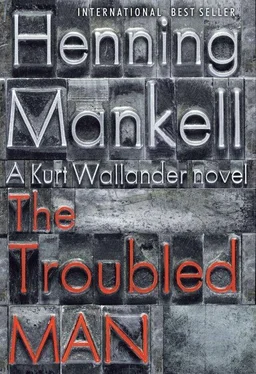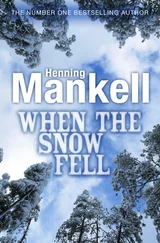“The place is dead,” said Wallander. “Where is everybody?”
The waiter shrugged.
“Not here, that’s for sure,” he said. “Enjoy your meal.”
Wallander only picked at the food. He dug out his cell phone and scrolled through the numbers in his address book. He wanted to talk to someone. But who? He put the phone down since he didn’t want anyone to know that he was drunk. The wine bottle was empty, and he had already had more than enough. But even so, he ordered a cup of coffee and a glass of cognac when the waiter came to tell him the place was about to close. He stumbled when he got to his feet. The waiter gave him a tired look.
“Taxi,” said Wallander.
The waiter called from the telephone attached to the wall next to the bar. Wallander could feel himself swaying from side to side. The waiter replaced the receiver, and nodded.
The wind was icy cold when Wallander came out into the street. He sat in the backseat of the taxi and was almost asleep by the time it turned into his driveway. He left his clothes in a pile on the floor, and passed out the moment he lay down.
Half an hour after Wallander fell asleep, a man hurried into the police station. He was agitated, and asked to speak to the night duty officer. It happened to be Martinsson.
The man explained that he was a waiter. Then he put a plastic bag on the table in front of Martinsson. In it was a gun, similar to the one Martinsson had.
The waiter even knew the name of the customer, since Wallander was well known in town.
Martinsson filled out a criminal offense form, then sat there for a long time staring at the revolver.
How on earth could Wallander have forgotten his service weapon? And why had he taken it to the restaurant?
Martinsson checked the clock: just after midnight. He really should have called Wallander, but he didn’t.
That conversation could wait until tomorrow. He wasn’t looking forward to it.
When Wallander arrived at the police station the following day, there was a message waiting for him at the front desk, from Martinsson. Wallander swore under his breath. He was hungover and felt awful. If Martinsson wanted to speak to him the moment he arrived, it could mean only that something had happened that required Wallander’s immediate presence. If only it could have waited for a couple of days, he thought. Or at least a few hours. Right now all he wanted to do was to close the door to his office, unplug his phone, and try to get some sleep with his feet on his desk. He took off his jacket, emptied an open bottle of mineral water, then went to see Martinsson, who now had the office that used to be Wallander’s.
He knocked on the door and went in. The moment he saw Martinsson’s face he realized it was serious. Wallander could always read his mood, which was important since Martinsson swung constantly between energetic exhilaration and glum dejection.
Wallander sat down in the guest chair.
“What happened? You only write me notes like that if something important has come up.”
Martinsson stared at him in surprise.
“You mean you have no idea what I want to talk to you about?”
“No. Should I?”
Martinsson didn’t reply. He merely continued looking at Wallander, who began to feel even worse than he had before.
“I’m not going to sit here guessing,” he said in the end. “What is it you want?”
“You still have no idea why I want to talk to you?”
“No.”
“That makes things harder.”
Martinsson opened a drawer, took out Wallander’s service pistol, and put it on the desk in front of him.
“I take it you know what I’m talking about now?”
Wallander stared at the revolver. A shudder ran down his spine, and almost succeeded in banishing his hangover. He recalled having cleaned his gun the previous evening — but then what happened? He groped around in his memory. The gun had migrated from his kitchen table to Martinsson’s desk. But how it had gotten there, what had happened in between, he had no idea. He had no explanations, no excuses.
“You went to a restaurant last night,” said Martinsson. “Why did you take your gun with you?”
Wallander shook his head incredulously. He still couldn’t remember. Had he put it in his jacket pocket when he drove into Ystad? No matter how unlikely that seemed, apparently he must have.
“I don’t know,” Wallander admitted. “My mind’s a blank. Tell me.”
“A waiter came here around midnight,” said Martinsson. “He was agitated because he had found the gun on the bench you had been sitting on.”
Vague fragments of memory were racing around in Wallander’s mind. Maybe he had taken the gun out of his jacket when he’d used his cell phone? But how could he possibly have forgotten it?
“I have no idea what happened,” he said. “But I suppose I must have put the gun in my pocket when I went out.”
Martinsson stood up and opened the door.
“Would you like a coffee?”
Wallander shook his head. Martinsson disappeared into the hall. Wallander reached for the gun and saw that it was loaded. He broke into a sweat. The thought of shooting himself flashed through his mind. He moved the gun so that the barrel was pointing at the window. Martinsson came back.
“Can you help me?” Wallander asked.
“I’m afraid not this time. The waiter recognized you. You’ll have to go from here straight to the boss.”
“Have you already spoken to him?”
“It would have been dereliction of duty if I hadn’t.”
Wallander had nothing more to say. They sat there in silence. Wallander tried to find an escape route that he knew didn’t exist.
“What will happen now?” he asked eventually.
“I’ve been trying to read up on it in the rule book. There will be an internal investigation, of course. There’s also a risk that the waiter — Ture Saage is his name, incidentally, if you didn’t know that already — might leak information to the press. Nowadays you can earn a few kronor if you have the right kind of information to sell. Careless, drunken policemen could well sell a few extra copies.”
“I hope you told him to keep his mouth shut?”
“Of course I did! I even told him he could be arrested if he leaked any details of a police investigation. But I think he saw through me.”
“Should I talk to him?”
Martinsson leaned over his desk. Wallander could see that he was both tired and depressed. That made him feel sad.
“How many years have we been working together? Twenty? More? At first you were the one who told me what to do. You told me off, but you also gave credit when it was due. Now it’s my turn to tell you what to do. Nothing. You could only make things worse. Don’t speak to the waiter; don’t speak to anyone. Except for Lennart. And you need to see him now. He’s expecting you.”
Wallander nodded and stood up.
“We’ll try to make the best of this,” said Martinsson.
Wallander could tell from his tone of voice that he was not particularly hopeful.
Wallander reached out for his gun, but Martinsson shook his head.
“That had better stay here,” he said.
Wallander went out into the hallway. Kristina Magnusson was passing, a mug of coffee between her hands. She nodded to him. Wallander could tell that she knew. He didn’t turn around to check her out as he usually did. Instead he went into a bathroom and locked the door. The mirror over the sink was cracked. Just like me, Wallander thought. He rinsed his face, dried it, and contemplated his bloodshot eyes. The crack divided his face in two.
Wallander sat down on the toilet seat. There was another feeling nagging at him, not just the shame and the fear following what he had done. Nothing like this had ever happened before. He couldn’t recall ever having handled his service issue pistol in a way that broke the rules. Whenever he took it home he always locked it away in the cabinet where he kept a licensed shotgun that he used on the very infrequent occasions he hunted hares with his neighbors. But there was something affecting him much more deeply than having been drunk. Another sort of forgetfulness that he didn’t recognize. A darkness in which he could find no lamps to light.
Читать дальше












